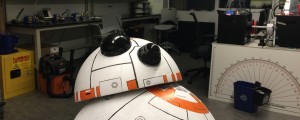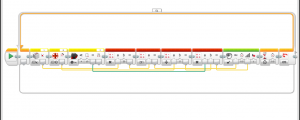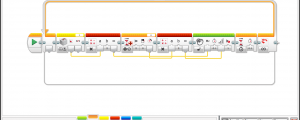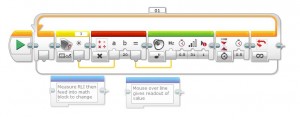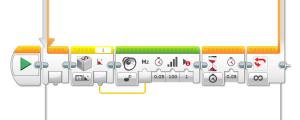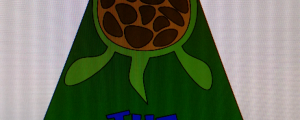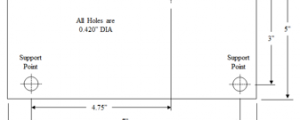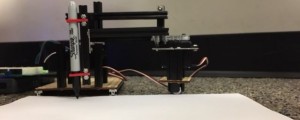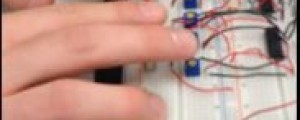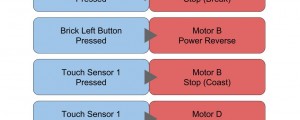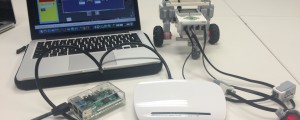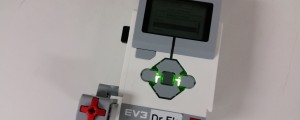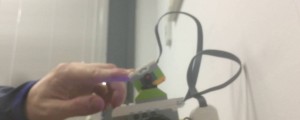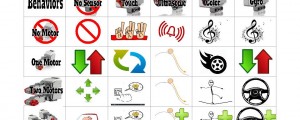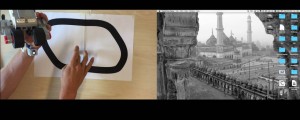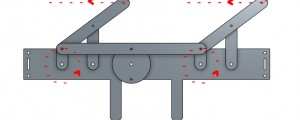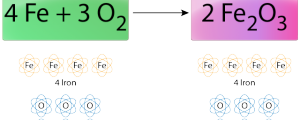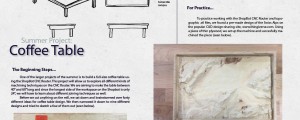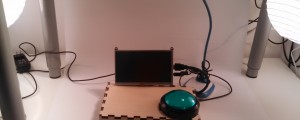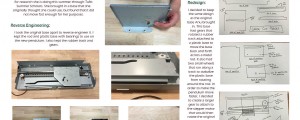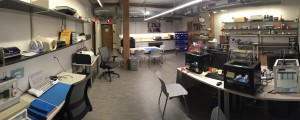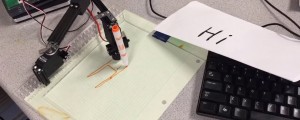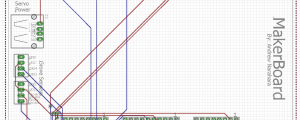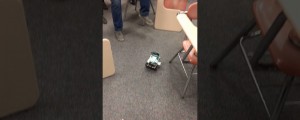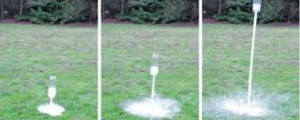Baby BB-8
In late January a video of a bluetooth-controlled BB-8 droid created by Angelo Casimiro started circulating around the tech news circuit. Angelo's detailed instructions and well-made video were particularly interesting because he managed to build his BB-8 for just $120 by cleverly using cheap…
FitBit
People enjoy tracking their fitness. And especially with their friends. We made a program that can read a person’s fitbit data (only their steps and goals) after they give us permission. It then sums everyone’s steps for the day, and displays the progress on an LED strip.
Skype Call Box
The purpose of this project is to have an easy way to see if our boss Chris was in his office, and to contact him easily without having to text or email him. Since Chris’s office is over a mile away, it is not feasible to walk over to check if he is in his office. Instead we created 2 myRIOs, with s…
The Rover Writer 1
This was the final project for my advanced robotics class. Our goal was to design a robot that could take in an image, process it, and then recreate it on paper. The method we decided to use was that of a mobile printer – the wireless device goes through the image one pixel at a time starting with t…
A sample code
Read the gyro - send it into the speaker - and add a little wait so that you can hear the sound
Elevated Bicycle Storage System
For my senior design project, my group was tasked with building a way to provide professors' and students' with an indoor storage option for their bicycles. We followed an in-depth design process, eventually building an elevated storage system mounted on the wall in the Bray Laboratory, one of the…
Maker Tools
Maker Tools is a suite of makerspace technologies that tackle many of the common problems that makerspaces encounter within universities, libraries, and classrooms. These tools are being developed by graduate and undergraduate students at the Center for Engineering Education and Outreach (CEEO).…
Remote-controlled Robotic Car
For this project, my team and I created a myRio-powered car that could be controlled by a tilt-sensing remote. The remote contained a second myRio, which has an accelerometer inside of it that can sense which direction the Rio is being tilted in. This allowed us to write a program that would spin…
Amusement Park Design Project
For this project, my team and I used Solidworks modeling to design an amusement park ride. Our ride, the 'Turtle Twister', is able to swing back and forth, as well as rotate, all the while making sure that its passengers don't experience more than 3 g's of acceleration so as to ensure their safety.…
Solidworks Beam Deflection Project
This project was for my Machine Design class. We were given a template to work with, with holes in the upper left, bottom left, and bottom right corners, with the bottom two holes to be fixed and a 4 pound force to be applied downward at the top hole. The template can be seen in the image below. We…
Harry Potter Visual Basic Quiz/Mini Game
For my introductory class on computer tools for engineers, we spent a lot of time learning how to use Microsoft Excel's Visual Basic Editor to write complex spreadsheet formulas, as well as form coding. For my final project, I decided to create an interactive, Harry Potter-themed quiz game on…
Prosthetic Leg Materials Research Paper
This was my final project for my Engineering Materials class, and was a culmination of all the information and data on materials we had learned throughout the course. I researched several materials commonly used in prosthetic limb design, and then selected which ones I would use to construct a leg,…
Second Image Processing Robot
This is essentially a new and improved version of the original Image Processing Arm I built, only with a much improved hardware system, a modified code, and a new way of importing the picture. One of our main issues with the previous arm was that it was fairly unstable, so I completely rebuilt the…
Second Image Processing Robotic Arm
This is essentially a new and improved version of the original Image Processing Arm I built, only with a much improved hardware system, a modified code, and a new way of importing the picture. One of our main issues with the previous arm was that it was fairly unstable, so I completely rebuilt the…
The 'Yayguitar'
This project was for my class on Music in Engineering. This was one of my favorite projects, as it combined my interest in design with my passion for music, and allowed me to create a brand new type of instrument. I worked with a team to design the hardware for a completely acoustic instrument (no…
Image Processing Robotic Arm
For this project, we were tasked with designing a robot attached to a camera that could take a snapshot of a drawn letter, process the image, and then send the image to a robotic arm that would subsequently draw the letter. In order to solve the problem, my partner and I attached an external webcam…
Speaker Design Project
This was my final project in my introductory mechanical engineering class from Freshman year about the fundamentals of electronics in music production. I really enjoyed this class because it combined by interest in mechanical design with my passion for music, and for my final project, my team and I…
Distributed EV3
The Problem Using wires for communication and power imposes several constraints on users. Wires need to be hooked up correctly and can get in the way of the motions you want your robot to execute. Also, the centralized brick provides several limitations, as sensors and motors must be within a…
Event-Driven EV3
Why Event-Driven EV3? New EV3 users often encounter challenges translating their ideas into functioning code. It seems, intuitively, like the solution to certain problems should be obvious, but it is actually syntactically complex. One such problem is how to perform an operation whenever a certain…
Online RoboLab
Motivation: One of the biggest problems we've encountered in introducing the LEGO ev3 robotic kit into the classroom was the availability of laptops and software. This project intends to eliminate this barrier so that any classrooms with available networks could conduct activities using the ev3…
Python Programming for the EV3
What does programming in Python on a Linux system for the EV3 enable you to do? Running a Linux system on the EV3 brick allows you to expand the functions of the EV3. Some examples include: Posting to social media (FB, Twitter, etc.) Sending data between multiple EV3s and interpreting data from…
WeDo Internet of Things
The Problem The use of the LEGO WeDo 2.0 is limited to the WeDo software, which is very graphical and simple in nature, allowing children to easily use the system. However, the WeDo can only communicate back and forth to the WeDo software and nothing else. By using the WeDo Software Developer Kit,…
EV3 Quickstart
The Problem Robotics kits such as the LEGO EV3 system often have a high barrier to entry. If you are new to robotics you have to experiment and learn how the motors and sensors work and the capabilities of each component. However, in order to do that you must also know how to program your robot.…
Physical Programming for the EV3
Programming a LEGO EV3 Robot by Physical Manipulation
JumboTap RFID Tag System
Through the Tufts Maker Network, Tufts students have access to all the specialized materials and equipment they need to turn their ideas into reality. With so many new tools to explore, students quickly run into challenges, or want to ask for advice. Engineers at the CEEO are working to create an…
Roller Coaster Physics
Design and build a roller coaster using everyday items, learning concepts in physics along the way. Trang Ngo & Will Luna, Tufts University CEEO 2015 Final Project The roller coaster is meant to be used as a tool for easily explaining various concepts in physics, including gravity, friction,…
KIBO Robotics Construction Kit
Since 2007, through generous funding by the National Science Foundation (NSF Grant No. DRL-1118897, DRL-0735657), the DevTech Research Group has been researching how to create a developmentally appropriate robotics construction set for young children in Pre-K through 2nd grade. The first prototype…
Oreo De-creamer
Start with something small When our group met with Dan Hannon to discuss the idea of starting a new product and making-oriented club, he suggested that we test out the idea with something small and fun. A video of an Oreo cookie separator was floating around the internet at the time, so we decided…
Adaptive Cutting Board
This was a final project for ENP 105 - Assistive Technology in the Fall of 2013. The goal was to design and create an assistive technology device that could help someone either in the workplace or with everyday life. Emily and I were directed to Outside the Lines Studio in Medford, MA, where we met…
Arduino Arcade
Have students build a simple arcade-style game using Arduino, breadboard, resistors, LEDs, buttons, sensors, and any other electronics materials available. Students should code some program to help keep score or determine the game's winner. Students can build games such as Whack-a-Mole, copy cat…
Biomimetic Creature
The first team project of this summer is to create a walking robot. These first few days were focused on designing the skeleton with moving legs. Later on in the summer, we will be revising these prototypes and adding electrical components. In order to be able to mimic an animal-like movement, we…
Bloombot
Bloombot is an autonomous hydroponic gardening system. We designed and built Bloombot for the 2009 RICC competition at WPI. Check out the Bloombot Wiki, slides from our presentation, and our written report. Gallery
Box Projector
During Tufts MAKE's first general interest meeting we had students think of project ideas they'd like to work on. One student was interested in creating an inexpensive portable projector, so we built this shoebox prototype using instructions we found online. Components The prototype is made of just…
Bray Lab Storage Rack Dividers
Purpose One of the goals for this summer at Bray was to find a way to help organize the material in the machine shop. We noticed the rack near the laser cutter held three disorderly piles of acrylic which were difficult to sift through to find the right piece. To fix this, we decided to create rack…
Calculating Speed Using Trigonometry
Through this project, students will use trigonometry to calculate the speed of a runner. By measuring time, distance, and angles, the students will be able to determine the speed of a moving object. Authors Luke Hanley, Vincent Bett, and Nico Lusardo Description For this project, one would need a…
Car Design: Convert Potential Energy into Kinetic Energy to Power a Car
Convert some form of potential energy into kinetic energy to power a car. Students can use gravitational energy to release their car from a slide, or students can use elastic potential energy to power their car with rubber bands, springs, or a mousetrap. Students should design a car and any other…
Cardboard Sleds
During Tufts MAKE's first general interest meeting we had students think of project ideas they'd like to work on. One student noticed that many Tufts students used plastic bins or lids as makeshift sleds during the winter, and that they often left behind sharp bits of plastic when those sleds…
Cell Analogy
The goal of this project is to make an analogy of a cell to some real-world object or location, and then construct a model of the real-world object. Students should first imagine and plan out an analogy, describing the parts of the cell, their functions, and why their analogies are appropriate.…
Chemical Reaction Using Clay Model Molecules
Prompt Each student or team picks a simple chemical reaction to recreate using clay model molecules. The molecules can be made with popsicle sticks and colored clay balls. The popsicle sticks represent chemical bonds, and the different colored clay balls represent different atoms. The students take…
Coffee Table
The Beginning Steps... One of the larger projects of the summer is to build a full-size coffee table using the ShopBot CNC Router. This project will allow us to explore all different kinds of machining techniques on the CNC Router. We are aiming to make the table between 40" and 60" long…
Creating a Picture using Functions
Create a visual picture by graphing a series of functions. Students should choose some image to recreate and then use various different functions to graph out the picture. Multiple functions of different types should be utilized within the project and a list of all of the functions used should be…
De-lux & Irrelephant
Makers: Quinn Wongkew, Riley Wood, Brook Nichols, Zack Pagel Summary De-Lux and Irrelephant are the Tufts Robotics Club's latest entries into the Trinity Firefighting competition of Spring 2014 held by Trinity College. The goal of the competition is to design and build a robot capable of navigating…
DI-Wire Computer Stand
A 6’7″ friend of mine came to me asking if I could build a more elegant solution to his makeshift cardboard box computer stand. So I decided to make a stand for him using the DI-wire. I started with brainstorming ideas and settled on a final geometric triangular design. The sides would be made usi…
Documentation Station
The documentation station I'm prototyping is currently being catered towards/tested in a 5th grade Novel Engineering classroom. Where we are with the Doc Station now... Raspberry pi running python code (currently using doc_apr8.py), a giant green push button which takes or deletes photos, and a USB…
Engineering, Simple Machines, and Math
This challenge was intended to be done in 2 hours by the interns. We had not done any exploration of the MINDSTORMS kits or gears prior to this and it ended up taking longer than expected. The activity would fit much better in a scaffolded LEGO Robotics curriculum where the students have some…
Food Web Tile Game
In this project, we designed an interactive boardgame for students to familiarize themselves with concepts of food chains, food webs, and tropic pyramids. Authors Trang Ngo & Will Luna, Tufts University CEEO 2015 Final Project All of the finished tiles can be used to create a boardgame in which…
How can a cloud hold water?
Fourth graders become animated discussing water, clouds, and evaporation. Fourth-graders Jordan and Elea convince their class to ask how a cloud holds water. Background Project This is another episode is from the project Responsive Teaching in Science, which was funded by the National Science…
Inverted Pendulum
Anu Gamage, an electrical engineer at Tufts, came to Bray Lab asking for help building an inverted pendulum for research she was doing this summer through Tufts Summer Scholars. She brought in a base that she originally thought she could use, but found that it did not move fast enough for her…
Jumbo Shrimp v1.0
Jumbo Shrimp v1.0 is our new experimental robot. It uses an omni-directional drive that allows it to move in any direction while maintaining the same orientation/heading. Jonah took the lead on this and used cardboard prototypes to test the robot's feasibility until eventually settling on the final…
Jumbo's Maker Studio
**Note: The Maker Studio is currently closed for the fall semester of 2016.** Jumbo’s Maker Studio is an interdisciplinary makerspace on the third floor of the Collaborative Learning and Innovation Complex (CLIC) in the Human Factors Lab. Join our Facebook page to keep up with the latest events and a…
LED Neurons
Program LEDs with the Arduino to represent biological processes. Learn basic logic and syntax of coding, and how to make that code interact with circuits of lights, resistors, and photovoltaic sensors. Authored by Trang Ngo & Will Luna, Tufts University CEEO 2015 Final Project Touching the…
LEGO Equation Balancer
Use LEGO and a Laser Cutter to create a system of gears that help students solve and visualize chemical balancing equations. The teacher's challenge to the student: Build a physical machine that helps explain or visualize a common problem in chemistry. By Trang Ngo & Will Luna, Tufts…
Letter drawing using vision and image processing
As a follow up to the letter drawing bot, we were tasked with creating a bot capturing a drawing created by a user and replicating it. Our first attempt to solve this problem used continuous image capture and processing to track the user's motion as they drew their image. The interface consisted of…
Maker Network status board
I'm interested in building a status board webapp that can use the Maker Network site's API to display each makerspace's upcoming events, who's in each space, and recent photos taken within that space. Each of Tufts' makerspaces would get one of these status boards. Panic Inc. makes an iOS app…
ME 184 Robotic Car
Robotic Car controlled with steering wheel. MyRio's were used for car and wheel. The wheel position is found by using the MyRio accelerometer and PWM values for continuous servos are sent using shared variables to the car's onboard MyRio. Link to LabView…
ME 184 Robotics RC Car
Charlie McQuinn, Matt Rothstein, Trevor Vassallo, Harry Brown -This project utilizes 2 MyRio devices to act as a remote controlled car. The accelerometer data of one is used to control the motors of the other to move the car. https://drive.google.com/open?id=0B_qxHkNl9Ow2TEk1ZThTUl9maWs
ME184 Robotic Car
For this project we used two myRIO's to construct a steering wheel that controls a car. For the steering wheel we utilized the accelerometer to obtain positional data which was then send to our car through shared variables. The car read the steering wheel data int he form of duty cycles. For…
Missile Launch
Students will be asked to launch a marble through a ring at a given height and to land in a specfied location. Students need to design and build a device to shoot their marble and to use physics equations to determine the trajectory of its motion. Students are given complete control over what type…
MOST: Make, Organize & Storage Tray
Introduction (originally from here) MOST (Make Organize & Storage Tray) is a system for helping students and teachers spend more time MAKING than setting-up and cleaning-up when they use a Makerspace. This is specially true when a full class is using a limited space, with limited amounts of…
myRIO Robotics Kit
Originally from here. The goal of this project is to lower the "getting started" barrier required to create electronics and robotics projects with National Instruments' myRIO. The myRIO Robotics Kit provides an entry-level system for students who are new to robotics to easily build robots…
Origami Geometry
Use congruency, trigonometry, and proofs to calculate the surface area of your origami creations! For more ideas, see: Geometric Exercises in Paper Folding, T. Sundara Row Project Origami, Thomas Hull Authored by Trang Ngo & Will Luna, Tufts University CEEO 2016 Final Project Video of solution…
Othermill Exploration
What is a Mill? A mill is a machine used to cut material using a rapidly spinning cutter. The idea is that the cutter removes material in a process known as subtractive manufacturing. The head of the mill moves based on a computer model, removing material until only the desired model is left. What…
Paper Circuits Exploration
Using paper, copper tape, batteries, LEDs, and more, students will explore basic circuits and switches. After understanding the basics, students will be able to use the concepts they have learned to create their own project ideas. Authors Luke Hanley, Vincent Bett, and Nico Lusardo. Big idea A…
Periodic Table Card Game
According to many students, introductory chemistry is difficult because they don’t understand the fundamental chemistry concepts. This project aims to come up with an interesting way for students to memorize the different properties of elements in the periodic table. This is a card game that brings t…
Physics in Scratch
Model Gravity, Force, and Acceleration using Scratch, an online visual programming environment. The final project can be seen here: https://scratch.mit.edu/projects/94278072/ A great resource for getting started with Scratch that is available in both English & Indonesian: Bahasa Indonesia:…
Precipitating Pachyderm v1.0
This was the Tufts Robotic's Club entry for the Trinity Fire Fighting Robot Competition in 2010. Google Docs Folder with working documents (these are the source documents for what's shown below) Solidworks Files and other random files are posted here: drop.io/firebot Initial Team Breakdown…
Precipitating Pachyderm v2.0
The Precipitating Pachyderm v2.0 is more or less the same as last year's robot but has a new smaller/lighter extinguishing system and totally redesigned electronics. Work was done to filter and calibrate sensors for better precision and to achieve better robustness and reliability. We first took on…
Redesigning Bray Lab's Training Projects
Our team was tasked with redesigning the original Yellow Zone Training Project - the Wall Hook. The wall hook had many advantages: low-cost, small number of parts, and required a wide range of skills to manufacture correctly. But it also had issues: Large number of holes led to long lines at the…
Remote Control Car
Liz Fletcher, Scott Barbano, Bobby McLaughlin, Qiaochu Hu In this project, Scott Barbano, Bobby McLaughlin, Qiaochu Hu, and I worked together to create a remote controlled car. The user was able to control the car by tilting the remote forward, backward, right, or left. The MyRio in the controller…
Remote Controlled myRIO Car
Andrew Narahara, Matt Mueller, Eric Abboud, and James Aronson created this remote control car using the NI myRIO. One myRIO in the "steering wheel" reads in and processes accelerometer data. This myRIO then writes two sets of duty cycles and frequencies to a shared variable. This shared…
Remote-Controlled Robot Car
This project was a steering wheel remote and car that communicated to each other using two separate NI myRIO processors. The remote read in the angle at which it was being held using an accelerometer and sent corresponding speed and direction values to the car to control the car's movement similar…
Revitalizing Malden High School’s Workbenches
Jonathan Rooney: One of the largest engineering spaces currently missing from the Tufts campus is a student-accessible wood shop. But over at Malden High School, professors and Tufts students are working to create a fully-equipped wood shop/makerspace in Nedlam’s Workshop, a mere ten-minute drive f…
Rube Goldberg ‘Non-Soda’ dispenser
The aim of this project is to showcase in a nutshell most of the physics simple machines in action. It also shows transformation of energy from potential to kinetic. Authors Luke Hanley, Vincent Bett, and Nico Lusardo. Completed Rube Goldberg Machine It looks like you have JavaScript…
Shooting a Projectile Using a Chemical Reaction
Prompt How far can you shoot a projectile using a chemical reaction? Build a system that shoots some object (ie a cork, ping pong ball, bottle rocket) powered solely by a chemical reaction. Have the students showcase their devices and whoever shoots the projectile highest wins. Examples of chemical…
Stages of Mitosis
For this project, we were tasked with creating a visual representation of a biological process using the equipment available in the lab. After a brainstorming session, we decided to make a HUE animation of the process of mitosis. For this project, we decided to use the 3D printers, the laser…
Sumobots
This was a relatively short project in which we designed and 3D printed mini-sumo robots. They will be featured in a Tufts web communications video. Future work lies in iterating the design a few more times and assembling kits to sell to raise funds for more club projects. See the working wiki for…
The Jumbonator
Jumbonator is a 12lb battlebot designed by Jon Gowa, CAD'd by Will Langford, and built by the two of them. It first competed at Motorama 2009 and later the same year at the Franklin Cup. To our knowledge is the only hobby-weight pneumatic flipper in the Northeast Region. For Motorama 2010 we…
Thinkboard
Problem Whiteboards and Post-Its are great for organizing thoughts, capturing ideas, and getting everyone on the same page, but in public spaces (like makerspaces) they frequently get erased or tampered with, despite any "Don't Erase!" warnings. For project teams working week-to-week,…
Tufts Dash
The Big Idea “All of Tufts at a glance” Year after year, Tufts students are increasingly relying on their smartphones to check their dining hall’s menu, look up the Joey’s schedule, and find Tufts-based events to attend. The problem is that doing so is a big pain using a smartphone’s web browser – particularl…
Tufts TIHRA: Tele-operable in-home Robotic Assistant
(Originally from here) About We are a group of mechanical engineers from Tufts University, who are working on building a tele-operable soft robotic manipulator and arm to assist a quadriplegic person with daily activities. We are currently involved in the RoboSoft Grand Challenge, competing in the…








